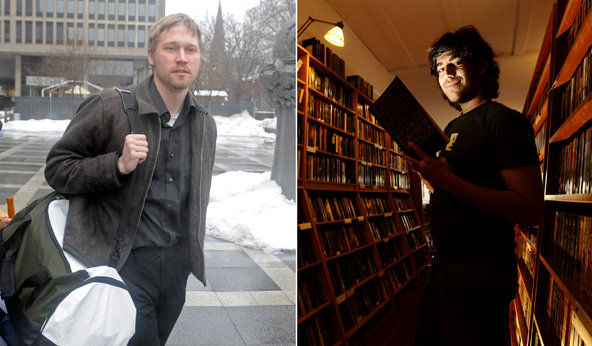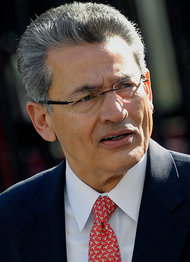Federal investigators said they were able to identify the man, Donald Sachtleben, a former bomb technician, as a suspect in the leak case only after secretly obtaining A.P. reporters’ phone logs, a move that set off an uproar among journalists and members of Congress of both parties when it was disclosed in May.
Mr. Sachtleben, 55, of Carmel, Ind., who was an F.B.I. agent from 1983 until 2008 and was later hired as a contractor, has agreed to serve 43 months in prison for the leak, the Justice Department said. His case is the eighth leak-related prosecution under the Obama administration. Only three such cases were prosecuted under all previous presidents.
“This prosecution demonstrates our deep resolve to hold accountable anyone who would violate their solemn duty to protect our nation’s secrets, and to prevent future, potentially devastating leaks by those who would wantonly ignore their obligations to safeguard classified information,” said Ronald C. Machen Jr., the United States attorney for the District of Columbia.
Mr. Sachtleben has separately agreed to plead guilty and serve 97 months in the pornography case. His total sentence, should a judge accept the plea deal, is 140 months, or nearly 12 years. The 43-month sentence for leak-related offenses is the longest ever imposed by a federal civilian court in such a case, although a military judge last month sentenced Chelsea Manning, formerly known as Pfc. Bradley Manning, to 35 years in prison for leaking archives of documents to WikiLeaks.
Paul Colford, a spokesman for The A.P., would not discuss the case, saying, “We would never comment on our sources.”
The case originated in a successful intelligence operation in April 2012 that disrupted a plot by Al Qaeda in the Arabian Peninsula, a Yemen-based offshoot of the main group, to destroy an airliner. The government was able to obtain a special underwear bomb apparently designed by the terrorist group’s master bomb maker, Ibrahim al-Asiri, to evade detection in airport security checks.
On May 7, 2012, The A.P. broke the news that the bomb plot had been disrupted, setting off further disclosures.
That evening, Richard A. Clarke, a former Clinton administration national security official who had been briefed on the case by John O. Brennan, then the top White House counterterrorism official and now the C.I.A. director, said the plot never came close to being carried out because it was under “insider control” by intelligence officials.
Soon, The Los Angeles Times, The New York Times and other news organizations reported that the would-be suicide bomber in the operation had been a double agent.
The disclosure about the Yemen bomb plot came as Republicans were accusing the White House of deliberately leaking a variety of secret information to make President Obama look tough on national security issues in an election year, an allegation that the White House denied. Amid Republican calls for independent prosecutors, Attorney General Eric H. Holder Jr. assigned Mr. Machen to handle the Yemen bomb plot case.
Nearly a year later, in May 2013, the Justice Department disclosed that after the F.B.I. had interviewed more than 550 officials and been unable to solve the case, investigators secretly used subpoenas to telephone companies to obtain calling records for 20 lines associated with A.P. bureaus and reporters. The scope and secrecy of the subpoenas outraged journalism organizations and lawmakers of both parties, who accused the department of going too far.
The Justice Department said the phone records had proved crucial in identifying Mr. Sachtleben as a suspect. In a bizarre coincidence, investigators then discovered that other law enforcement officials had already seized his computer and other electronic materials in an unrelated child pornography investigation.
“Sachtleben was identified as a suspect in the case of this unauthorized disclosure only after toll records for phone numbers related to the reporter were obtained through a subpoena and compared to other evidence collected during the leak investigation,” the Justice Department said. “This allowed investigators to obtain a search warrant authorizing a more exhaustive search of Sachtleben’s cellphone, computer and other electronic media, which were in the possession of federal investigators due to the child pornography investigation.”
A court filing said agents discovered evidence that he had stored classified intelligence information on the computer without authorization, leading to a separate charge under the Espionage Act.
During his 25-year career with the F.B.I., Mr. Sachtleben worked on many major terrorism cases, a court filing said, including the 1993 World Trade Center bombing, the 1995 Oklahoma City bombing, the 1998 American Embassy bombings in Africa, the 2000 bombing of the American destroyer Cole in Yemen, and the terrorist attacks of Sept. 11, 2001.
He held a top secret clearance and, among other assignments, he worked for the explosives unit at the F.B.I. laboratory in Quantico, Va. The court filing said that he met one of the A.P. reporters, identified only as Reporter A, in 2009, and that in the following years he helped the journalist with information about bomb-related issues.
One court filing quoted text messages in which the reporter reached out to Mr. Sachtleben on April 30, 2012, after ABC News reported that Mr. Asiri might have been working on bombs that could be surgically implanted. Mr. Sachtleben and the reporter exchanged several text messages, quoted in the court filing, speculating about the ABC report. As it turns out, the contractor was about to take a trip to Quantico. On May 2, he visited the lab where the underwear device was being examined, it said, and soon called the reporter.
Two and a half hours later, the court filing said, two A.P. reporters began calling government officials saying they knew that the United States government had intercepted a bomb from Yemen and that the F.B.I. was analyzing it.
The next day, May 3, 2012, law enforcement agents in Indiana, working on an unrelated case involving the distribution of child pornography on the Internet, obtained a search warrant for Mr. Sachtleben’s house, court filings show. They seized his computers on May 11.

Article source: http://www.nytimes.com/2013/09/24/us/fbi-ex-agent-pleads-guilty-in-leak-to-ap.html?partner=rss&emc=rss


